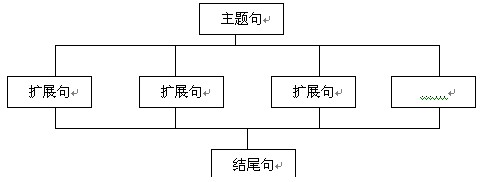2014考研英语写作指导:段落的写作_跨考网
一篇文章可由几个自然段组成。文章中的句子和段落均为文章的中心思想服务,形成一个有机的整体。好的段落必须是意思完整,语义连贯,完全体现文章主旨中心,同时又是层次分明,结构严谨,逻辑关系应用合理的。
一、段落的组成
一个段落由三部分组成:
1.主题句(Topic Sentence):点出段落的主题(谈论什么)。
2.扩展句(Developing Sentence):说明和支持主题。
3.结尾句(Concluding Sentence):得出结论。

二、段落的主题
一篇文章有中心意思,也就是题目。而每个段落则有段落主题,段落主题是为文章中心思想服务的。
每个段落只能有一个主题(central idea),它用一个句子加以表达,所以称为主题句。主题提出后需要很多结构严谨的句子来支持和说明,称为扩展句。最后得出一个结论,并用一个结尾句表达。参看下面段落:
(主题句)Slavery in the United States existed almost unchanged for 250 years.(扩展句1)During this time, most slaves were not allowed to marry or to raise families.(扩展句2) Usually they were not allowed to learn to read.(扩展句3) It was very dangerous for a slave to travel, since even free Negroes could be kidnapped and sold at any time. (结尾句)Under these conditions, it was almost impossible for them to organize to help each other.
三、写好主题句
定义:主题句为一个完整的句子,用以概括、叙述和说明该段的主题。
位置:主题句一般位于段首,也可置于段尾或段中,考生最好放在段首,这样较易掌握和构思。例如:
位于段首:在英文中,大部分段落的第一句便是主题句。开门见山地提出问题,后面的扩展句围绕主题句加以说明、支持、补充和解释。
Learning English at college is different from learning English at the middle school. In the middle school, the students are more dependent and passive. But college students must solve most of the problems by themselves. They will have to consult the dictionaries and reference books by themselves and prepare their lessons.
位于段尾:主题句位于段尾便于总结全段的内容,给读者以深刻的印象,是写作中的一种演绎方法。
Similarly, in order to write successful answers to essay questions on history or anthropology examinations, a student must arrange the relevant facts and opinions according to some accepted pattern of paragraph structure. And certainly when a student writes a book report for English, or a critiques for politics studies, or a term paper for sociology, style and organization are often as important as content. Clearly, the ability to write well organized, concise paragraphs and essays is essential to a student’s success in almost all university courses.
位于段中:位于段中的主题句起承上启下的作用,这类主题句多起转折作用,一般由“but, however, yet, anyhow, nevertheless”等词连接,用于引起下文。
What we teach ourselves sometimes indeed in more useful than what we learn from others. Some great men had little or no schooling. But these great men probably studied harder by themselves than most boys do in school. The greatest minds do not necessarily of those who have never been able to distinguish themselves at school, have been very successful in life later. It has been said that Wellington and Napoleon were both dull boys at school, and so were Newton and Albert Einstein.
无主题句:有的段落中无主题句,段落的主题思想通过文章内容来提示,这种方法能促使读者对文章内容时行思考和分析,但考生一般不宜在考试中采用这种方法:
There came a breeze, then a gust of wind, The wind became stronger. It rattled the windows, turned up the fallen leaves, bent down the trees. Distant rumbling thunder was heard and came nearer and nearer. Large drops of rain began to fall. Flashes of lightening lit up the sky. Thunder roared overhead. Now the rain poured down,
写好主题句的方法:
1. 主题句要概括一定内容,不要空泛,否则扩展句将难以说明和支持它,例如:
空泛:English language is very important.
概括:English language is very important in our daily life.
空泛:The Olympic Games are exciting.
概括:In the Olympic Games the football teams from many countries compete intensely.
2. 尽量使用简单句或简洁明了的句子:
简洁:Collecting stamps is her hobby.
复杂: She likes collecting stamps which is her hobby.
简洁: I enjoyed watching Gone with the wind very much.
复杂:Gone with the wind was a good film which I enjoyed watching very much.
3. 主题句应该做到句子完整和表达的主题思想完整:
不完整:How to write a composition.
完整:How to write a composition is not an easy thing to talk about.
不完整:If the weather was fine.
完整:If it was fine, we would have had a good time.
4. 写好主题句中的关键词。
关键词是直接表达主题的词汇,它决定段落的内容和展开的方法,引导整个段落的发
展,例如:
There are several ways to boil the water.
The task can be finished in three steps.
There is a new method to reduce the cost.
四、写好扩展句和段落
围绕主题句展开,支持、说明和阐述主题句的句子便是扩展句。扩展句紧扣主题句中的关键词而展开,句子与句子之间逻辑清楚,上下转承结合得当,简明扼要,重点突出。一般来说,每个自然段除了主题句与结尾句之外,还包含了3-6个扩展句。所以,写好了扩展句便基本上完成一个自然段落。
做题时,一旦定下了主题和关键词,作者便按照自己的思路来组织段落中的句子,句子之间要具有连贯性,就必须由一系列的逻辑关系构成,例如:并列关系,因果关系,递进关系,转折关系,解释关系,概括关系,顺序关系,让步关系,对照比较关系,转换关系等等,这些逻辑关系可由一系列的过渡词(transitional words)来完成。过渡词在句子与句子之间、段落与段落之间起到承上启下的作用,使句子或段落之间的衔接自然、连贯,逻辑合理,结构严谨,故极为重要。
例如:
构成时间关系的过渡词有:first, in the first place, since then, thereafter, there fore, lately, later, meanwhile, at last等。
构成空间关系的过渡词有:before, behind, below, between, beyond, farther, in front of , near to, next to, over, under, up, close to等。
2022考研初复试已经接近尾声,考研学子全面进入2023届备考,跨考为23考研的考生准备了10大课包全程准备、全年复习备考计划、目标院校专业辅导、全真复试模拟练习和全程针对性指导;2023考研的小伙伴针也已经开始择校和复习了,跨考考研畅学5.0版本全新升级,无论你在校在家都可以更自如的完成你的考研复习,暑假集训营带来了院校专业初步选择,明确方向;考研备考全年规划,核心知识点入门;个性化制定备考方案,助你赢在起跑线,早出发一点离成功就更近一点!
| 考研院校专业选择和考研复习计划 | |||
| 2023备考学习 | 2023线上线下随时学习 | 34所自划线院校考研复试分数线汇总 | |
| 2022考研复试最全信息整理 | 全国各招生院校考研复试分数线汇总 | ||
| 2023全日制封闭训练 | 全国各招生院校考研调剂信息汇总 | ||
| 2023考研先知 | 考研考试科目有哪些? | 如何正确看待考研分数线? | |
| 不同院校相同专业如何选择更适合自己的 | 从就业说考研如何择专业? | ||
| 手把手教你如何选专业? | 高校研究生教育各学科门类排行榜 | ||
相关推荐
跨考考研课程
| 班型 | 定向班型 | 开班时间 | 高定班 | 标准班 | 课程介绍 | 咨询 |
| 秋季集训 | 冲刺班 | 9.10-12.20 | 168000 | 24800起 | 小班面授+专业课1对1+专业课定向辅导+协议加强课程(高定班)+专属规划答疑(高定班)+精细化答疑+复试资源(高定班)+复试课包(高定班)+复试指导(高定班)+复试班主任1v1服务(高定班)+复试面授密训(高定班)+复试1v1(高定班) | |
| 2023集训畅学 | 非定向(政英班/数政英班) | 每月20日 | 22800起(协议班) | 13800起 | 先行阶在线课程+基础阶在线课程+强化阶在线课程+真题阶在线课程+冲刺阶在线课程+专业课针对性一对一课程+班主任全程督学服务+全程规划体系+全程测试体系+全程精细化答疑+择校择专业能力定位体系+全年关键环节指导体系+初试加强课+初试专属服务+复试全科标准班服务 |



